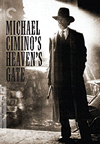 Heaven’s Gate, 1980, Criterion Collection, DVD released in 2012, two disks, 216 minutes, $39.95
Heaven’s Gate, 1980, Criterion Collection, DVD released in 2012, two disks, 216 minutes, $39.95
The epic Western Heaven’s Gate is a tragedy in the timeline of film history, a costly picture that both ruined the career of its director, Michael Cimino, and drove the studio that financed it, United Artists, to near bankruptcy (a year later MGM bought out the studio). The film itself, however, 32 years later and digitally restored by Criterion, is strikingly beautiful.
The promising young auteur director Cimino was coming off the Oscar success of The Deer Hunter. But no mercy was shown him after Heaven’s Gate, which made him a bigger target than a 14-point white-tailed buck. Cimino separated himself from his “disaster” movie for decades. But he has now overseen the newly restored 216-minute cut of the film whose first cut upon release in 1980 New York Times critic Vincent Canby compared to “a forced, four-hour walking tour of one’s own living room.” Widely panned by critics and audiences (at least those able to catch it), the $36 million blockbuster made roughly $3 million, making it one of the biggest box-office flops to date. While the film does at times test one’s patience, particularly in the meandering second hour, by no means did it deserve its now infamous reputation.
The weakness of this marathon Western is its unfocused plot, which centers on Wyoming’s Johnson County War of 1892, and simplifies the conflict into a fight between the poor, good, hardworking immigrant homesteaders and the evil, rich, power-hungry cattlemen. The film primarily follows Marshal James Averill (Kris Kristoferson) and Nate Champion (the great Christopher Walken)—fictionalized versions of real-life characters. They both love the same woman, Isabelle Huppert’s Ella Watson, and, eventually, both side with the European settlers in their rebellion against Frank Canton (Sam Waterston) and the Wyoming Stock Growers Association, which plans to kill 125 of these homesteaders deemed “thieves and anarchists.” This film, however, is less about a series of events than it is a criticism of capitalism and an examination of the rich and poor in America.
But both its plot and sermonizing class commentary detract from the real star of Heaven’s Gate: it’s superb execution of visual indulgence and intricacy. It is of a Fordian (John, that is) scale and sophistication, magnificent in both its authenticity to the period and grandiose representation of the American frontier. The sets, costumes and cinematography, from the prologue’s grand ceremony at Harvard University to a bloody gunfight at Nate Champion’s frontier ranch, display a visual mastery matched by only a select few in the genre. Supported by a stronger narrative, its artistry could have put this film in the pantheon of Westerns.
Louis Lalire




